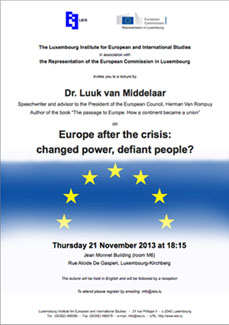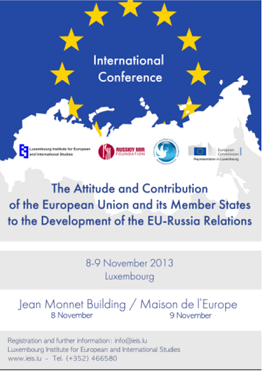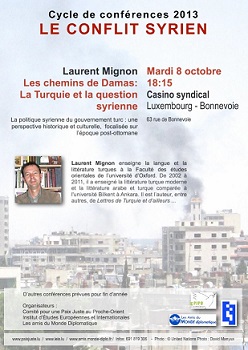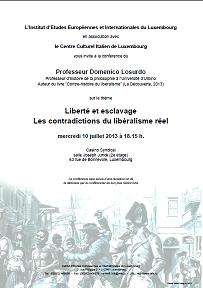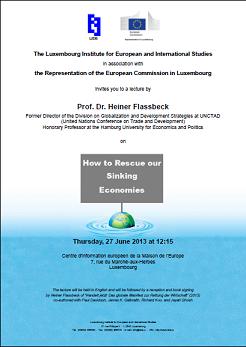Institut d'Etudes Européennes et Internationales du Luxembourg
Conférence-débat
L’Institut d’Etudes Européennes et Internationales du Luxembourg,
Les Amis du Monde Diplomatique Luxembourg,
avec le soutien de neimënster,
invitent à la conférence-débat
„Les promesses suicidaires des transhumanistes“
donnée par Jacques Testart
mardi le 29 octobre 2019 à 18.15 h.
à l’Abbaye de Neumünster (salle Edmond Dune), 28 rue Münster, Luxembourg.
Jacques Testart, biologiste, directeur de recherche honoraire à l’Institut national de la santé et de la recherche médicale, est le père scientifique du premier bébé-éprouvette français né en 1982. Il développe une réflexion critique sur les avancées incontrôlées de la science et de la technique dans ses nombreux écrits, dont Faire des enfants demain (Seuil 2014), L’Humanitude au pouvoir (Seuil 2015) et Au péril de l'humain (Seuil 2018).
Prière de s’inscrire par mail à info@ieis.lu ou par téléphone au 621313923.
Conferences
“The Roma people or what it means to be European”
Saturday 28 May 2016
Media Center, Terazije 3, Belgrade
“Improving human nature or transcending it?”
Sunday 29 May 2016
University of Belgrade
Center for Democracy, Faculty of Political Science, University of Belgrade
Luxembourg Institute for European and International Studies
Program
10.00-11.30: Human nature and its discontents. Human aggression and human apocalypse. The rationale for the improvement of human beings.
11.30-11.45: Coffee break
11.45-13.15: Living in a society of perfect(ed) humans: heaven or hell or …....?
13.15-15.00: Lunch
15.00-16.30: Will the perfect “human” be transhuman / posthuman?
16.30-16.45: Coffee break
16.45-18.15: What could, what should be done (since the genie has already left the bottle)? Creating “homo ethicus”?
Summer seminar 2015 in Vama Veche
“The world in 2100”
Professor Gerhard Michael Ambrosi, Professor Christopher Coker and Dr. Armand Clesse, with the support of Maria Popescu from the European Cultural Center from Bucharest and Alexandru Guzgan, will organize a summer seminar from 20 to 22 July 2015 in Vama Veche (Romania) on the topic “The world in 2100”.
Agenda:
Monday 20 July 2015:
18.00-20.00: 1st session: 2100: Extrapolating from 2015
Tuesday 21 July 2015:
10.00-12.00: 2nd session: Possible disruptions
18.00-20.00: 3rd session: Three scenarios: thriving; surviving; doom
Wednesday 22 July 2015:
10.00-12.00: 4th session: The kind of world that may appear desirable for 2100
18.00-20.00: 5th session: What should be done to bring such a world about?
Students and young researchers who are interested in attending the seminar should send their application before 12 June 2015 to info@ieis.lu.
Since the Luxembourg Institute for European and International Studies, which organized the seminar for twenty years in cooperation with the Black Sea University Foundation and the European Cultural Center, is no longer an operationally active entity (after the Government stopped the funding) and thus has no budget of its own, the participants will have to pay themselves their travel and accommodation costs. The organizers will offer the dinners for the participants during the conference days and also cover some organizational and logistical expenses.
Conference
Russia and the EU: the question of trust
Friday 28 and Saturday 29 November 2014, Luxembourg
The Luxembourg Institute for European and International Studies, the Russkiy Mir Foundation, the Russian Centre of Science and Culture in Luxembourg and the Alexander Gorchakov Public Diplomacy Fund will organize a conference on “Russia and the EU: the question of trust” in Luxembourg on Friday 28 an Saturday 29 November 2014.
In the wake of the Ukraine crisis there has occurred a growing estrangement between Russia and the European Union. The political conflict is likely to harm the interests of both sides and to cause lasting damage to the political, economic and strategic European fabric. Is there any realistic chance to overcome the rift and return to a common agenda in the interest of Europe as a whole?
Invitation letter
Conference
The Politics of Virtue: the crisis of liberalism and the post-liberal future
17 and 18 October 2014, Casino Luxembourg - Forum d'art Contemporain, Luxembourg
The Luxembourg Institute for European and International Studies organized a conference on “The Politics of Virtue: the crisis of liberalism and the post-liberal future” on Friday 17th and Saturday 18th October 2014 in Luxembourg.
Based on a manuscript by John Milbank and Adrian Pabst, the conference discussed the post-liberal turn of contemporary politics and alternatives to capitalism, liberal democracy and the liberal international order. The conference was structured in six parts that reflected the structure of Prof. Milbank’s and Dr. Pabst’s book. Each part combines a critique of liberalism with post-liberal alternatives. The first part explored the limits of liberal political thought and the shape of post-liberalism, while the second turned to the crisis of capitalism and the ‘civil economy’ alternative. In the third part, the emphasis was on the shortcomings of liberal democracy and the ‘mixed constitution’ alternative.The fourth part turned to the crisis of liberal culture and ways in which we can renew a high culture that is also a popular, folk culture. In the fifth part the focus shifted to the crisis of the liberal global order and post-liberal foreign policies. The sixth part was entitled ‘From narrative to policy’ and tries to translate the key concepts into policy ideas.
Summer Seminar: THE FUTURE OF FREEDOM
21-26 July 2014, Vama Veche, Romania
For the 20th year in a row, the Luxembourg Institute for European and International Studies (LIEIS), the Black Sea University Foundation and the European Cultural Centre, Bucharest, organised the international summer seminar in Romania on the Black Sea coast.
This year’s seminar was entitled "The Future of Freedom" and was held at Vama Veche, a youth resort about 50 km south of Constanța, on the border with Bulgaria. The seminar took place from the 21st to the 26th of July 2014 (see below agenda and leaflet).
The aim of the seminar was to examine whether freedom – as a concept or a goal of human endeavours – has changed its meaning in the course of the last century. Have the latest developments in politics and science altered the way we understand freedom? Can freedom be assessed? If so, by which criteria? Participants tried to answer these and other questions in the hope of better understanding the current dynamics of international society.
The seminar covered the following topics:
Human beings and freedom: how free can human beings be?
Is there an innate longing for freedom?
The state of freedom: how free are people in Western countries (in absolute and relative terms)?
How important is freedom in comparison with other values and goals such as security and equality?
The trends of modern society: are we heading towards more or less freedom?
Freedom and the welfare state
Freedom and democracy: compatibility of concepts
Socialism, capitalism, liberalism, anarchism and the question of freedom
Science, technology and the future of freedom
Conference
Evaluation des résultats des élections européennes
5 juin 2014, Maison de l'Europe, Luxembourg
L’Institut d’Etudes Européennes et Internationales du Luxembourg, en coopération avec la Représentation de la Commission européenne au Luxembourg, ont organisé une table ronde «Evaluation des résultats des élections européennes» le jeudi 5 juin 2014 de 17h à 20h à la Maison de l'Europe (7, rue du Marché-aux-Herbes, L-1728 Luxembourg).
Les participants à la table ronde ont discuté de la manière dont la campagne électorale s’est déroulée, des résultats et donc de la répartition des sièges et des performances des nouveaux partis qui pourraient avoir un impact majeur sur le paysage politique en Europe dans les années à venir.
Videos:
https://www.facebook.com/photo.php?v=647828628632370&set=vb.257533034328600&type=2&theater
https://www.facebook.com/photo.php?v=651254258289807&set=vb.257533034328600&type=2&theater
https://www.facebook.com/photo.php?v=651322661616300&set=vb.257533034328600&type=2&theater
https://www.facebook.com/photo.php?v=649862015095698&set=vb.257533034328600&type=2&theater
Conference
Human nature, national character, ethnicity and the future of war
7 and 8 June, Belgrade
The Luxembourg Institute for European and International Studies in association with the Anglo-Serbian Association and the Centre for Democracy of the Faculty of Political Science at the University of Belgrade organized a conference on “Human nature, national character, ethnicity and the future of war” on Saturday 7 June and Sunday 8 June 2014 in Belgrade.
Among the topics discussed: the Wars for Yugoslav Succession, human nature and aggression, culture and violence, the issues of tribalism and national character in the context of war.
Conference
The rise of anti-EU parties and the upcoming European elections
6 May 2014, Jean Monnet Building (Rue Alcide de Gasperi, Luxembourg-Kirchberg)
The Luxembourg Institute for European and International Studies, in cooperation with the Representation of the European Commission in Luxembourg, organized a conference on “The rise of anti-EU parties and the upcoming European elections” on 6 May 2014 in the Jean Monnet Building of the EU Commission, Luxembourg-Kirchberg.
In practically all EU countries, new political parties which reject the EU have emerged or grown stronger in recent years. In freewheeling discussions between experts from different countries, disciplines and affinities, we have examined this phenomenon and the similarities as well as the differences between different parties and movements. From there, we moved to the possible causes of this phenomenon such as the economic and financial crisis, the democratic deficiencies of the EU, the inflow of people from poorer EU countries as well as from the crisis areas in the EU neighbourhood. Thereafter we examind the impact this rise of anti-EU parties may have on the political society in Europe. Finally, we looked at the possible longer term developments and what could and should be done about this phenomenon.
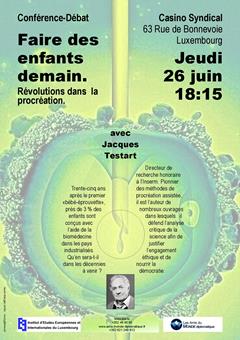
Lecture
L’Institut d’Etudes Européennes et Internationales du Luxembourg et les Amis du Monde Diplomatique ont organisé la conférence-débat «Faire des enfants demain. Révolutions dans la procréation», donnée par Jacques Testart le jeudi 26 juin 2014 à 18h15 au Casino syndical de Bonnevoie (63, rue de Bonnevoie L-1260 Luxembourg).
Trente-cinq ans après le premier « bébé-éprouvette », près de 3 % des enfants sont conçus avec l’aide de la biomédecine dans les pays industrialisés. Qu’en sera-t-il dans les décennies à venir ? S’il ne s’agit, selon la loi actuelle, que d’aider les couples stériles, l’assistance médicale à la procréation a désormais atteint ses buts avec l’optimisation des actes biologiques et médicaux. Mais la technique, sous couvert de médecine de pointe, cherche toujours à agrandir son territoire et à régenter nos vies, même lorsque la nécessité ne s’impose pas. Aussi, puisqu’aujourd’hui la régulation bioéthique fait l’objet d’une permissivité croissante, la question se pose de savoir jusqu’où ira la médicalisation de la procréation, et comment la société pourra en maîtriser les dérives sociétales et eugéniques. Devrons-nous aller jusqu’à compter sur la décroissance économique pour, mieux que les lois de bioéthique, imposer des limites à la démesure technoscientifique ?
Jacques Testart est directeur de recherche honoraire à l’Inserm. Pionnier des méthodes de procréation assistée, il est l’auteur de nombreux ouvrages dans lesquels il défend l’analyse critique de la science afin de justifier l’engagement éthique et de nourrir la démocratie.
Lecture
L’Institut d’Etudes Européennes et Internationales du Luxembourg, Stop Tafta Luxembourg et les Amis du Monde Diplomatique ont organisé la conférence-débat:
"Le Projet du Grand Marché Transatlantique. Ce qu'il cache"
donnée par
Raoul Marc Jennar
le mardi 8 avril 2014 à 20h00 au Casino syndical de Bonnevoie
Veuillez trouver ci-joint l'affiche de cette conférence-débat et quelques articles:
http://www.europaforum.public.lu/fr/calendrier/2014/04/conf-ttip-ieis/index.html
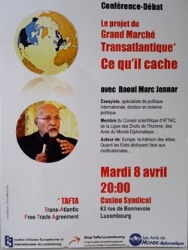
Lectures
L’Institut d’Etudes Européennes et Internationales du Luxembourg, le Comité pour une Paix Juste au Proche-Orient et les Amis du Monde Diplomatique ont organisé un cycle de conférences sur la situation politique en Syrie avec:
François Houtart
«Les enjeux de la guerre en Syrie»
le 11 décembre 2013 à 18.15h, Casino syndical de Bonnevoie
et
Reinhard Merkel
«La Libye et la Syrie comme modèles d’ingérence légitime?»
le 19 décembre 2013 à 18.15h, Casino syndical de Bonnevoie
Veuillez trouver ci-joint une brève présentation de ces conférences.
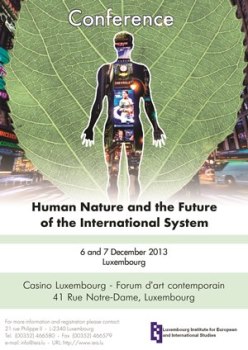
Conference
Human Nature and the Future of the International System
6 and 7 of December, Casino Luxembourg (Forum d'art contemporain)
The debates focused on: instinct and habits versus reason and ethics; the evolution of aggression; the role of education, political institutions and religion in containing, channelling, sublimating, diverting or extirpating violence.
The Attitude and Contribution of the European Union and its Member States to the Development of the EU-Russia Relations
Friday 8 November, 2013 - Jean Monnet Building (M1), Luxembourg
Saturday 9 November, 2013 - Maison de l'Europe, Luxembourg
The Luxembourg Institute for European and International Studies in cooperation with the Russkiy Mir Foundation, the Russian Centre of Science and Culture and the Representation of the European Commission in Luxembourg organized a conference on "The Attitude and Contribution of the European Union and its Member States to the Development of the EU-Russia Relations".
The ambition of the meeting was to bring together a group of distinguished scholars and experts. Among the topics discussed: EU member-states and EU-Russian relations; trade, energy and the Partnership for Modernisation; security, conflict management and global challenges. An extensive executive report of the conference will be prepared and circulated as widely as possible.
For more information (video):
https://www.youtube.com/watch?v=0qTWUVTZZGo&list=PLeJsDCJAf9gjuZ_B7xrgwWvarKdYVQTrg
Lecture
Dr. Luuk van Middelaar
on
Europe after the crisis: changed power, defiant people?
This lecture was organized by the
Luxembourg Institute for European and International Studies
in association with
the Representation of the European Commission in Luxembourg
on
Thursday 21 November 2013, 18.15
at the Jean Monnet Bulding (room M6), Luxembourg
Fore more information: http://www.europaforum.public.lu/fr/actualites/2013/11/luuk-van-middelaar-conference/index.html
Conference
Lecture
Laurent Mignon
Les chemins de Damas: La Turquie et la question syrienne
le 8 octobre à 18.15h
Casino syndical de Bonnevoie
Summer Seminar
Liberal democracy in the Asian century
Jointly organized with the Black Sea University Foundation and the European Cultural Centre in Bucharest, on the 22-27 July 2013 in Vama Veche (Romania).
The aim of the seminar was to examine whether the dominating political paradigm in large parts of the world since World War II will remain attractive or even gain in importance. Is it bound to decline and perhaps fade away with the rise of regions and countries that may choose a different path of political and economic development? What will a surge of religious fundamentalism, nationalism, new cultural confrontations, and the contest for ever scarcer natural resources mean for the prospects of liberal society?
► more
Lectures
Professeur Domenico Losurdo
sur le thème
Liberté et esclavage
Les contradictions du libéralisme réel
L'Institut d'Etudes Européennes et Internationales du Luxembourg
en association avec le Centre Culturel Italien de Luxembourg
a organisé la conférence "Liberté et esclavage. Les contradictions du liberalisme réel"
le mercredi 10 juillet 2013.
Pour plus d'informations: http://www.dei-lenk.lu/node/10482
Professor Heiner Flassbeck
on
How to rescue our sinking economies
It took place on Thursday 27 June 2013 at the Maison de l'Europe, Luxembourg.
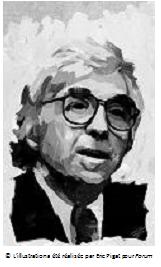
Conferences
Arno J. Mayer – Critical Junctures in Modern History
10 and 11 of May, Casino Luxembourg (Forum d'art contemporain)
This conference focused on the work and legacy of Luxembourg-born American historian Arno J. Mayer and aimed to discuss historical phenomena and to analyse them within current and future contexts. The topics chosen for discussion were the following: revolution and counter revolution, the persistence of the Ancien Régime, the 30 Year War of the 20th century, the Final Solution, the Middle East today, the future of American power, and finally continuity and contingency in history - Arno Mayer’s conceptual approach.
An executive summary will be published in the following months.
